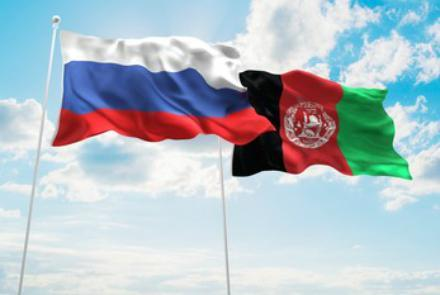Russia to Host Meeting on Afghanistan’s Peace Process

Amidst new efforts by the US to expedite Afghanistan’s reconciliation process, officials on Tuesday confirmed that Russia is planning to host a meeting on the Afghan peace process within the next 9 days and that it will invite key political leaders for the event.
Politicians from Afghanistan, including President Ghani and Abdullah Abdullah, the chairman of the High Council for National Reconciliation, as well as foreign envoys and the Taliban representatives, are expected to attend the meeting in Moscow on March 18 to discuss the Afghan peace process, the reconciliation council’s spokesman Fraidoon Khwazoon said.
“A conference will be held. Some figures have been invited. The reconciliation council chairman has also been invited,” Khwazoon said.
“The High Council for National Reconciliation is consulting on the meeting and will decide whether to participate in the conference or not,” he said, adding that “Russia has an important role in the Afghan peace process.”
The aim of the meeting is to accelerate Afghanistan’s peace talks in Doha to put an end to the Afghan conflict, a source said, adding that the meeting has been coordinated with the United States.
Envoys from China, US and Pakistan will attend the meeting, according to a source.
The Presidential Palace so far has not commented on the meeting.
This comes as the US proposed a United Nations-led conference in Turkey on Afghanistan’s peace.
US Secretary of State Antony Blinken in a letter to President Ashraf Ghani seen by TOLOnews put forth suggestions to the Afghan government to accelerate the peace process, including convening a UN-facilitated conference with international stakeholders, proposals to facilitate discussion between the two sides to form a negotiated settlement and ceasefire, a meeting in Turkey between both sides to finalize a peace agreement, and a revised proposal for a 90-day reduction in violence.
However, along with these proposals, Blinken made clear that the United States is considering all options regarding Afghanistan, including the May 1st deadline for full withdrawal.
This letter is reportedly similar to one shared with the chairman of the High Council for National Reconciliation, Abdullah Abdullah.
First, Blinken suggests that the UN should convene a meeting of foreign ministers and envoys from Russia, China, Pakistan, Iran, India and the US to discuss a unified approach to supporting peace in Afghanistan.
Second, US envoy Zalmay Khalilzad should share with President Ghani and the Taliban leaders written proposals “aimed at accelerating discussions on a negotiated settlement and ceasefire. “These proposals reflect some of the ideas included in the roadmap for the peace process,” Blinken wrote. On this point, Blinken elaborated: “In sharing these documents, we do not intend to dictate terms to the parties…. Rather the documents will enable the Islamic Republic and the Taliban to move urgently to the tasks of developing a) the foundational principles that will guide Afghanistan’s future constitutional and governing arrangements b) a roadmap to a new, inclusive government and c) the terms of a permanent and comprehensive ceasefire.”
Third, Blinken says Turkey will be asked to host a senior-level meeting of both sides in the coming weeks to finalize a peace agreement. Blinken urges Ghani or his “authoritative designees” to attend the meeting.
Blinken, in his fourth point, says the US has prepared a revised proposal for a 90-day reduction in violence, “which is intended to prevent a spring offensive by the Taliban and to coincide with our diplomatic efforts to support a political settlement between the two parties.” He asked President Ghani to “positively consider” the proposal for the reduction in violence.
Following his outline of these suggested steps, President Ghani said in the letter that the United States has not ruled out any option regarding Afghanistan:
“I must also make clear to you Mr. President, that as our policy process continues in Washington, The United States has not ruled out any option. We are considering the full withdrawal of our forces by May 1st, as we consider other options,” he writes.
Further, Blinken writes that even with the continuation of the US financial assistance to Afghan forces after an American withdrawal, he is “concerned that the security situation will worsen, and that the Taliban could make rapid territorial gains” and that he shares this so that President Ghani “understands the urgency of my tone regarding the collective work outlined in this letter.”
‘Too Early to Say How Afghan Talks Are Going’
The US State Department said on Monday that it is too early to say how Afghan peace talks are going, but the United States believes this is a moment when progress is possible, Reuters reported.
Reuters reports that State Department spokesman Ned Price also told a regular news briefing that the US special envoy for Afghanistan, Zalmay Khalilzad, would be based in Doha for some time.
“We have continued to encourage all sides to take part constructively and with a degree of alacrity, knowing that this is a moment in time where progress is possible,” Price said. “We want to do everything we can to facilitate that progress, to support dialogue, the inter-Afghan dialogue between the various parties. That’s precisely why we’re there.”
On Monday, Khalilzad and General Austin Scott Miller, Commander Resolute Support Mission in Afghanistan and met with Pakistan’s Chief of Army Staff and discussed the Afghan peace process, Pakistan’s Inter-Services Public Relations (ISPR) said in a statement.
“Matters of mutual interest, regional security and ongoing Afghanistan Reconciliation Process were discussed during the meeting,” it said, adding that “the visiting dignitary greatly appreciated Pakistan’s role in the ongoing peace process.”
